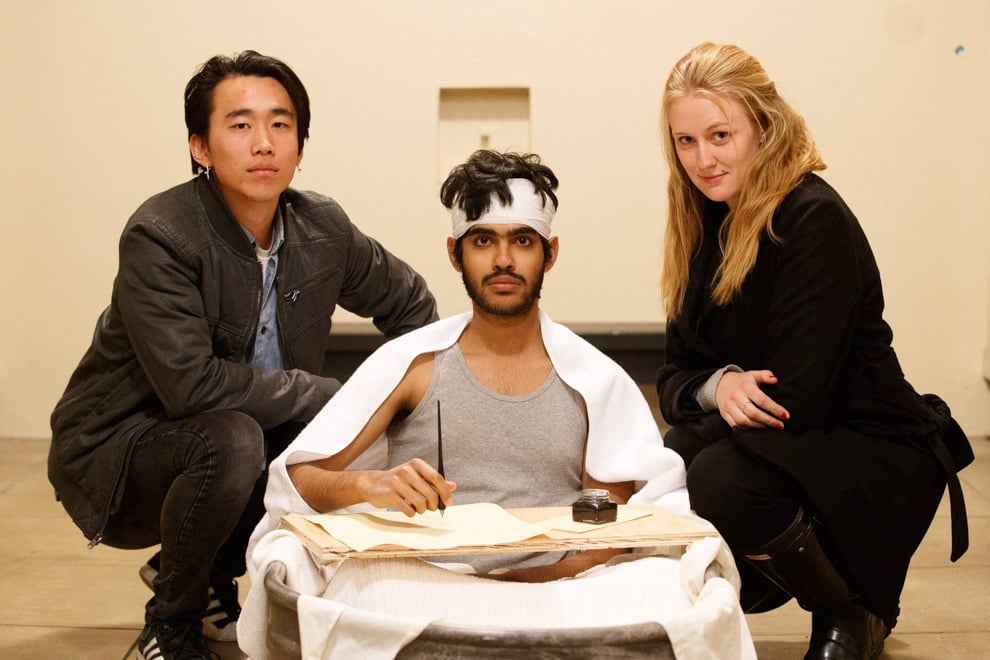If you see theater regularly, being bored is so common that seeing an engaging show is almost disorienting. Sitting through a play is normal; sitting forward to catch every word of a play is extraordinary. This is not to say that “Marat/Sade” (produced by Stanford Theater Laboratory and running March 1-3 in the Men’s Restroom 01-570 behind Memorial Church) is without its weak moments. But they stand out only because the energy and tension of the show is otherwise kept so high.
“Marat/Sade” (full title: “The Persecution and Assassination of Jean-Paul Marat as Performed by the Inmates of the Asylum of Charenton Under the Direction of the Marquis de Sade”) is technically set in 1808, after the French Revolution, in the Charenton Asylum. However, as the title suggests, the bulk of the piece is a play-within-a-play, performed by the inmates of the Asylum. The director of the Asylum, Coulmier, has organized the performance and enlisted the Marquis de Sade to write and direct it; Coulmier expects the production to be an endorsement of his political views, but the inmates have other ideas.
The Marquis de Sade (the man after whom sadism is named) really was confined to the Charenton Asylum; he really did write and direct plays there, and though he never wrote anything like the play performed within this piece, the horrors of the French Revolution described in “Marat/Sade” were absolutely real. Anatole Schneider ’20 delivers a compelling performance as the Marquis, particularly in his gravest moments: in an evening full of raucous displays of madness, his fascination with the four-hour torture and execution of an enemy of the state is perhaps the most petrifying speech of the play.
A note: I use the word “madness” to talk generally about the conditions experienced by the characters in the play, because the principal concern of the play is not the realistic portrayal of mental illness, but the examination of revolutionary themes through the lens of theatrical madness. It is a testament to the abilities of the director, Adi Chang ’19, that this madness is always compelling and almost never unduly distracting. The first director of the English-language version of “Marat/Sade,” Peter Brook, pointed out that “[the actor] has to cultivate an act of possession. As he does so, he faces a new difficulty…he has lines to speak—if he invents a character incapable of speaking them he will be doing his job badly. So the actor has to face two opposite job requirements.” Every single member of this cast has managed an almost impossible feat, delivering performances that are both convincing and understandable.
Jean-Paul Marat, the man at the center of the play, is played by Vineet Gupta ’18 (though, really, he is played by a paranoiac of the asylum, who is played by Gupta). His twitching, monotonic delivery serves to remind us that his actions in the play are determined by the Marquis’ writing and direction, and so, ultimately futile — like the revolution itself. Marat is attended by his assistant, Simonne Evrard, in a wonderfully precise and oddly funny portrayal by Lillian Bornstein ’18. The Herald (Phoebe Kimm ’20) moves the action of the play along, with such commitment and energy that her rhyming couplets sound completely natural.
Adding to the surreal quality of the show is the music. There are enough songs to make the show close to a full-on musical, but the songs don’t advance the plot or let us into the heads of the characters. Instead, they jolt us out of the story and remind us of the larger thematic context. If that sounds insufferable — believe me, it could be, were it executed by less committed performers. The Four Singers — Kokol, Polpoch, Cucurucu, and Rossignol (Josh Petersen ’19, Gianna Clark ’19, Anastasia Spiridonova ’21, and Almog Aybar ’21), have the energy of a dozen singers, and their jaunty tunes coupled with their often horrific lyrics create a forceful and disturbing soundscape.
This is not a play with a neat message. I’m not even sure it’s a play. It resists definition and explanation. The only thing it asks of you is attention: to see and experience what is happening on stage, allowing all its possible meanings to live at once. In one of the simplest and most affecting sequences of the show, Charlotte Corday (played by Davis Leonard ’19), Marat’s eventual assassin, sings of her reasons to kill Marat: “Change meant one thing to you, I see, and something quite different to me.”
Contact Minh-Anh Day at mday19 ‘at’ stanford.edu.
